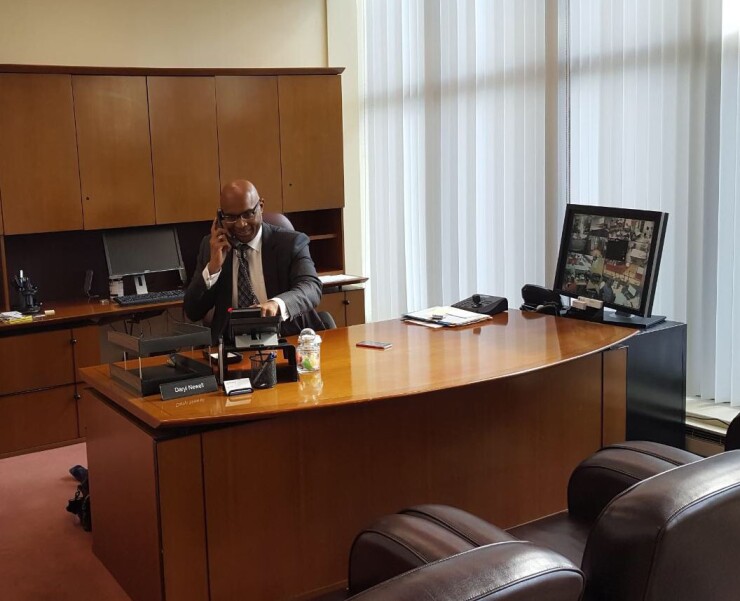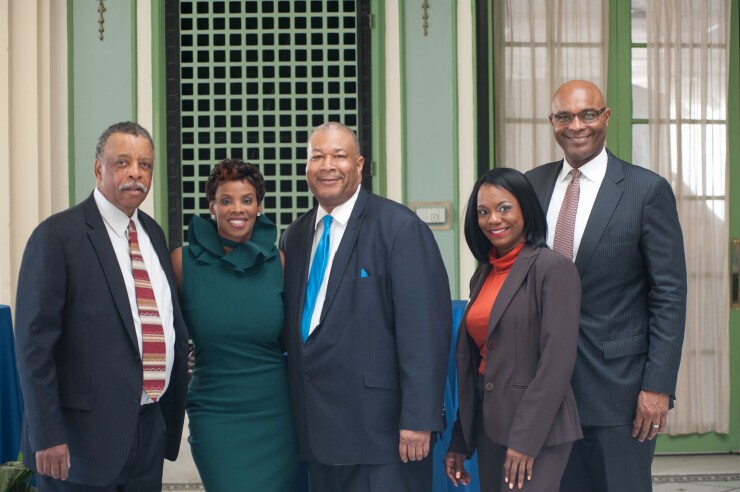Daryl Newell was
As Credit Union Journal has reported, after
In this exclusive CUJ Q&A, Newell shares his take on the transition from banks to credit unions, what football can teach about leadership and a few picks for the upcoming pro and college football seasons.

Credit Union Journal: It’s a long way from the Packers to a credit union. Can you give us a sense of the trajectory of your career and what led you from football to CUs?
Daryl Newell: There are many similarities between my football career and my credit union work. Like football, credit unions are about teams. That’s where it all begins — people working together to achieve a common goal. It’s like Vince Lombardi once said: “Individual commitment to a group effort — that is what makes a team work, a company work, a society work, a civilization work.” At Self-Help Federal Credit Union our mission is to create and protect economic opportunity for all, with a focus on communities that may be underserved by conventional lenders. Members enjoy all the benefits of a credit union while also supporting that larger mission. That means all of us are part of the same team. In addition, the leadership skills I obtained from being part of a team sport enabled me to make the transition from football to heading Seaway.
What does it mean to you to be named president of Seaway?
It's an honor to be named president and carry on Seaway's 52-year legacy. Seaway served an incredibly important role in the community, improving the lives of so many. I’m happy that Self-Help is continuing to carry on that history and I’m also happy to play such an important role in how we do it.
Seaway obviously at one time was a traditional bank, and banks often have a different mindset than credit unions. How are you helping staff and customers/members manage that transition?
The operational execution and sales conversations at banks and credit unions are comparable. What's different is the tax and ownership structure. Members own the credit union, while shareholders own a bank. Credit unions are tax-exempt and banks pay taxes. Most importantly though, credit unions have a focus on their members – and that’s really critical. We do what’s best for our members, with the goal of helping improve their lives. This goes beyond the notion of simply providing financial services. We are trying to impact our members’ lives in a much greater way.
How have you personally adjusted to that transition?
The transition has been smooth and largely what I expected. The community is firmly behind Seaway and our mission. I couldn’t be here if that wasn’t true. The community never left us. Instead, they rallied around us every time we hit a bump in the road. We’re family and this is what family does. So the transition has been much easier because of all of the community support.

Seaway was at one time one of the largest black-owned financial institutions in the Midwest. Can you give us a sense of how that history impacts it today?
Seaway was responsible for improving so many lives. So many businesses were started because of Seaway. The mortgage capital helped so many people become homeowners and build wealth. Seaway was also instrumental in teaching financial literacy throughout the community, especially in local schools. In fact, you can learn more about Seaway’s 52-year legacy of empowerment online [
What’s your focus for the first 12-18 months you’re in the job?
My focus is to: first ensure that the communities we serve know that Seaway is still here, ready to serve them and address local needs; second, meet with community stakeholders to identify ways we can work together to create economic opportunities for our neighbors; and finally use the findings from listening to community partners to offer the products, services and information required for consumers and businesses to be successful and create wealth.
What are the major challenges Seaway faces right now?
Our biggest challenge is overcoming the perception that Seaway has left the community and is no longer around to continue its legacy of providing responsible financial service to members. We’re here and we’ll continue to work hard to benefit the people of this community.

As someone who played football at the college and professional level, are there similarities you see between football and credit unions, or being part of a team and now in management?
Whether at the workplace or on the playing field, teamwork [is] the key to success. No matter what the organization, everyone has a precise role to play. That’s true no matter if you’re delivering financial services to a member or delivering a forward pass or scoring a touchdown on the field.
Give us your picks for the 2019 Super Bowl and college football national championship.
My picks are the Chicago Bears and Northwestern Wildcats. In this case, loyalty prevails over all.





